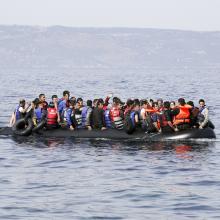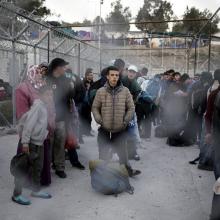Greece
Greece’s parliament approved a bill allowing same-sex civil marriage on Thursday, a landmark victory for supporters of LGBTQ+ rights that was greeted with cheers by onlookers in parliament and dozens gathered on the streets of Athens.
A population exchange with Turkey after World War I brought in over a million ethnic Greeks as refugees. When the new migration crisis began last year, there was empathy for the new arrivals, with many Greeks recalling what their grandparents went through.
But even given that proud history, academics and volunteers fear that the warm welcome of the last year could wear thin, when the refugees start to integrate in a nation that has long resisted a multifaith identity.

Image via REUTERS/Murad Sezer/RNS
Turkish authorities have allowed Hagia Sophia, a World Heritage site, to be used for Ramadan prayers, an act that has enraged Orthodox Christians who say the famed former church and mosque is supposed to be off-limits for any religious ritual.
Prayers for the holy Muslim month were first read at the start of Ramadan on June 8, prompting a swift and pointed response.

Image via Ververidis Vasilis / Shutterstock.com
According to the United Nations’ refugee agency, up to 500 refugees may have drowned last week when an overcrowded ship sank, reports CNN. The 41 survivors of “one of the worst tragedies involving refugees and migrants in the last 12 months” are currently being housed at a stadium in Kalamata, Greece.

Image via Drop of Light / Shutterstock.com
Just as Greece has begun deporting refugees to Turkey, the Vatican announced that Pope Francis will visit the Greek island of Lesbos.
In accordance with a new deal between the E.U. and Turkey, Greece has begun deporting refugees to Turkey, reports Al-Jazeera. Meanwhile, according to a report issued by Amnesty International, the Turkish government has been forcing Syrian refugees back to Syria. If this is true, Turkey would be violating international law.

Paper boats in memory of Mediterranean migrants, Enki Photo / Shutterstock
SINCE JANUARY, more than 1,750 migrants have died or gone missing in the Mediterranean Sea. That is more than 30 times higher than during the same period last year, according to the International Organization for Migration. The United Nations estimated that, as of the end of May, 90,000 migrants had come across the Mediterranean into Europe so far in 2015.
Last summer, Christian Peacemaker Teams, an international NGO that places unarmed intervention teams in situations of conflict to reduce violence, launched CPT-Mediterranean on the Greek island of Lesbos to support migrants arriving by sea. I served with that team and heard survivors’ stories firsthand. So what is going on?
Eleven million people were displaced by violence last year, according to The New York Times, most driven out of Syria, Iraq, Ukraine, and Afghanistan. However, tens of thousands are also pushed north from sub-Saharan Africa, fleeing desperate poverty and violence. It’s the worst migration crisis since World War II, according to the United Nations.
In the past, most migrants into the European Union came by land. In Greece, they entered along the border with Turkey. In 2012, Greece built a fence along the Turkish border to stop migrants and refugees from coming into the country. This forced migrants to enter Europe along Greece’s border with Bulgaria. In 2014, a fence was erected there too, effectively cutting off a primary land route into the European Union.
WASHINGTON — In a case that could determine restrictions on expressions of faith in the public square, the Supreme Court on Wednesday will consider religious prayers that convene government meetings.
At issue in Greece v. Galloway is whether such invocations pass constitutional muster, even when government officials are not purposefully proselytizing or discriminating.
Can a town council, for example, open its meetings with prayers invoking Jesus Christ, as happened repeatedly in the town of Greece, N.Y.?
“There’s a whole lot at stake here,” said Ira Lupu, a law professor at George Washington University who specializes in the First Amendment’s religion clauses.
“This case is about first principles: whether the government of a town, acting through its town board, can advance a particular brand of Christianity or any other faith,” said Lupu.
On the other side of the question, Jeff Mateer of the Texas-based Liberty Institute invokes free speech rights and hopes the court will reason that government has no business parsing the words of those who wish to pray in a public forum.
A 600-foot footrace was the only athletic event at the first Olympics, a festival held in 776 B.C. and dedicated to Zeus, the chief Greek god.
For the next millennium, Greeks gathered every four years in Olympia to honor Zeus through sports, sacrifices and hymns. The five-day festival brought the Greek world together in devotion to one deity.
What began in ancient Greece as a festival to honor a single god, Zeus, has now become an almost Olympian task, as organizers of the games navigate dozens of sacred fasts, religious rituals and holy days.
The London Olympics will try to accommodate religious athletes with 193 chaplains, a prayer room in every venue and a multifaith center in the Olympic Village.
Athletes at the ancient Olympics believed their training honored the gods, and victory was a sign of favor from a deity. As contests like wrestling, boxing, and horse racing were added to the Olympic roster, they supplemented devotional sacrifices, hymns, and ceremonies.
“The idea was that you were training to please Zeus. But part of the festival would be to visit the temple, visit the cult statues, making offerings, celebrating and seeing your family,” said David Gilman Romano, a professor of Greek archaeology at the University of Arizona.
The combination of Greek sport and worship led the Roman Emperor Theodosius I, a Christian, to ban the Olympics in 393 A.D.
I love seeing who is chosen as TIME Magazine’s Person of the Year.
But sometimes TIME's honoree is not just a “Person.” Sometimes it’s “Persons” or even a thing.
Sometimes it’s the biggest news story of the year. Sometimes it encapsulates the zeitgeist, global urgings, or our collective mood.
This time around, it’s all of those things: A person, a group, a zeitgeist, a news story.
According to TIME, 2011 is the year of “The Protester.”





